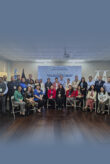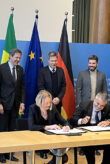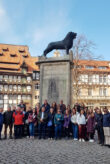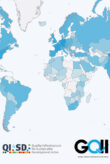The evaluation report Triangular cooperation in German development cooperation has been published. In this report, special mention is made of PTB’s five successful cooperation projects in Latin America and the Caribbean.
It was not without good reason that triangular cooperation projects have been increasingly moving into the focus in International Cooperation since 2011. The association, which – in most cases – consists of an industrialized country as a traditional donor, a transition country as a South donor and a third country as a recipient country, offers many advantages. In particular, the partners from the transition country meet the recipient country on their own eye level, as they can contribute their own experience made in development cooperation and thus have a more sensitive understanding for the connected challenges due to their similar cultural and political background. At the same time, transition countries can strengthen their own political position in development policy. This form of cooperation allows all participating partners to realise a particularly intensive international knowledge exchange and to promote joint learning.
The German Federal Ministry for Economic Cooperation and Development (BMZ) commissioned a comprehensive evaluation of already existing triangular cooperation projects in order to be able to analyse the concrete benefit and the development possibilities of such projects. On the basis of these results, BMZ intends to develop recommended actions for improving concepts and a forward-looking definition. The evaluation was carried out by the German Institute for Development Evaluation (DEval). A reference group with representatives of BMZ, the German Society for International Cooperation (GIZ) and PTB accompanied the process.
Altogether, DEval carried out 16 country case studies in the three target regions of Latin America, Asia and Sub-Saharan Africa. For this purpose, five triangular cooperation projects of PTB took place in the regions of Latin America and the Caribbean. The evaluation report reveals that even if the effectiveness and efficiency of the measures can be extended here and there, there is still great potential for long-term positive impacts at the political and strategic level: cooperation relations will be newly created, South-South cooperation will be promoted and development cooperation structures will be strengthened. Both in the report and by the representatives in the reference group meetings, PTB’s five triangular cooperation projects were pointed out very positively. Special mention was made of the “excellent technical expertise” as well as the high replicability.
What follows next is an implementation planning phase. BMZ, the German Society for International Cooperation (GIZ) and PTB adopt the recommendations of the evaluation and take them into account for the future concept design and implementation of triangular cooperation projects.
We are especially pleased that the UN Office for South-South Cooperation (UNOSSC) has chosen a PTB triangular cooperation project as an example of good practice for the publication of Good Practices in South-South Cooperation and Triangular Cooperation. PTB’s project has the title Trilateral cooperation on natural gas metrology in Latin America. The publication has been planned for this year.
The evaluation report and a comment of BMZ can be consulted under the following link:








